About NAPOLI 3
Thank you for your interest in NAPOLI 3.
NAPOLI 3 is a clinical study of an investigational drug called irinotecan liposome injection. The study is now enrolling patients with untreated metastatic pancreatic cancer. NAPOLI 3 is being conducted by Ipsen Bioscience.
The purpose of NAPOLI 3 is to determine whether irinotecan liposome injection is safe and effective when given in combination with other approved cancer drugs in patients not previously treated for metastatic pancreatic cancer, compared to standard of care treatment.
Patients will be randomly assigned to one of the following two arms:
Arm 1
Irinotecan liposome injection with oxaliplatin plus 5-fluorouracil and leucovorin (5-FU/LV)
Arm 2
Nab-paclitaxel plus gemcitabine
Please note that you will be told which arm you have been assigned to.
Learn more about NAPOLI 3 (study identifier: NCT04083235) at ClinicalTrials.gov.
Metastatic Pancreatic Cancer
When cancer spreads from one area of the body to another, for example to other organs, this is called metastasis. Metastatic pancreatic cancer is a type of cancer that develops in the pancreas and spreads to other areas of the body. Metastatic pancreatic cancers usually spread to the abdomen and liver first but can also spread to other organs, such as the lungs and brain.
Because this type of cancer has spread, or metastasized, surgery is not generally a treatment option for patients. Other treatment options like chemotherapy and immunotherapy are more common because they can target a number of areas at once.
Irinotecan Liposome Injection with Oxaliplatin Plus 5-FU/LV
Please note, irinotecan liposome injection will be administered to patients in Arm 1 only.
Irinotecan liposome injection is an investigational drug being developed as a possible treatment for metastatic pancreatic cancer. It has been shown to be effective in combination with 5-FU/LV in patients with metastatic pancreatic cancer who previously received a gemcitabine-based treatment, but stopped responding to that treatment. In this study, the aim is to determine if it is effective in combination with oxaliplatin and 5-FU/LV for patients with metastatic pancreatic cancer who have not received any previous first-line treatment.
The active ingredient is irinotecan, which in other cancers has been shown to stop cancer cells growing uncontrollably, therefore preventing the spread of cancer. Irinotecan is surrounded by a protective shell, known as a liposome. This liposome will help to delay the release of irinotecan until it reaches the cancer cells. Please note that irinotecan is not yet approved as a first-line treatment for pancreatic cancer.
Irinotecan liposome injection is being tested in combination with oxaliplatin and 5-FU/LV. This investigational drug will be given on Days 1 and 15 of each 28-day cycle as an infusion (drip) into Arm 1 patients’ veins, as follows:
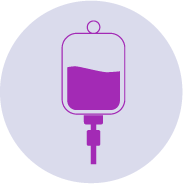
Irinotecan Liposome Injection
90 Mins
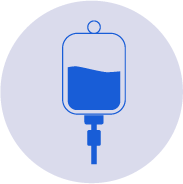
Oxaliplatin Infusion
120 Mins
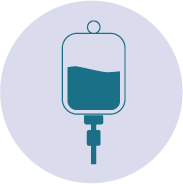
Leucovorin (LV) Infusion
30 mins after oxaliplatin
30 Mins
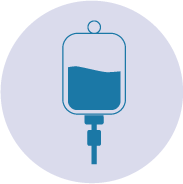
5-Fluorouracil (5-FU) Infusion
Within 60 mins after LV administration
46 Hours
This infusion will be completed at home using a 5-FU pump.
Nab-Paclitaxel Plus Gemcitabine
Please note, nab-paclitaxel plus gemcitabine will be administered to patients in Arm 2 only.
Nab-paclitaxel plus gemcitabine is a current worldwide standard of care for the treatment of patients with metastatic pancreatic cancer who have not received any previous first-line treatment.
These drugs are a type of chemotherapy drug, used to stop cancer cells from growing uncontrollably and thus preventing the spread of the cancer.
Nab-paclitaxel plus gemcitabine treatment will be given on Days 1, 8, and 15 of each 28-day cycle as an infusion (drip) into Arm 2 patients’ veins, as follows:
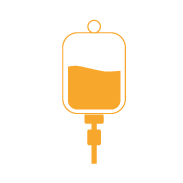
Nab-Paclitaxel Infusion
5 Mins
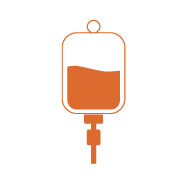
Gemcitabine Infusion
30 Mins
Study Timeline
There are 3 periods in this study:
Screening, Treatment, and Follow-Up.
-
Screening
Screening Period
The purpose of the Screening period is to determine if you are eligible to take part in the study.
You will visit the study center to take part in the informed consent process. During this process, study doctors will tell you everything you need to know about the study, provide you with written information to read and take home to discuss with family or friends, and answer any questions that you may have.
If you are happy to continue and provide informed consent, doctors will then perform a number of screening assessments to assess your eligibility.
You may decide to withdraw from the study at any time, even if you previously consented to participate. You will not be penalized and your decision will not affect your medical treatment in any way.
-
Treatment
Treatment Period
The Treatment period is made up of a number of 28-day cycles. You will receive your assigned study drug for as long as your cancer is responding to it. If your cancer gets worse, or if your study doctor decides that the study drug is not suitable for you, then the study drug will be stopped and suitable treatment options will be discussed with you.
Every 8 weeks, after your first dose of your assigned study drug in the cycle, you will undergo a CT or MRI scan to check if your cancer is still responding to the study drug.
The visit schedule you will complete during the Treatment period depends on if you are assigned to Arm 1 or Arm 2. The visit schedules for both Arm 1 and Arm 2 are presented below.
-
Arm 1
-
- CYCLE (Repeats until period ends)
- Day 1 - Receive Study Drug
- Day 3 - Remove 5-FU pump
- Day 15 - Receive Study Drug
- Day 17 - Remove 5-FU pump
- Every 8 Weeks - CT/MRI Scan
Arm 1 Treatment Period
Patients in Arm 1 will have scheduled visits at the study center on Days 1 and 15 of each cycle.
At these visits, patients will receive irinotecan liposome injection and complete in-clinic assessments and questionnaires. In addition, on Days 3 and 17, patients will either need to return to the clinic to remove the 5-FU pump or a nurse might come to their house to do this.
-
Arm 2
-
- CYCLE (Repeats until period ends)
- Day 1 - Receive Study Drug
- Day 8 - Receive Study Drug
- Day 15 - Receive Study Drug
- Every 8 Weeks - CT/MRI Scan
Arm 2 Treatment Period
Patients in Arm 2 will have scheduled visits at the study center on Days 1, 8, and 15 of each cycle.
At these visits, patients will receive nab-paclitaxel plus gemcitabine and complete in-clinic assessments and questionnaires.
-
Follow-Up
-
- End of Treatment Visit - (30 days after last dose)
- Follow-Up Visits - (Every 2 Months)
Follow-Up Period
When you stop receiving your assigned study drug, you will enter the Follow-Up period of the study. In the Follow-Up period, you will attend an End of Treatment visit at the study center 30 days after your last dose of the study drug. At this visit, you will undergo some assessments to check your health and evaluate your response to the study drug.
Every 2 months, after the End of Treatment visit, someone from the study team will contact you to monitor your health and well-being.
What are clinical studies?
It is hoped that the information gained from the NAPOLI 3 study will help in the treatment of future patients with pancreatic cancer. To learn more about the importance of clinical studies, please watch the video below.
Find a Study Center
NAPOLI 3 is taking place in up to 20 countries. Approximately 750 patients will take part in the study at 200 – 245 centers around the world. In the US, there are 90 – 100 centers enrolling patients.
Please use the map below to find a study center near you. Study centers will be added to the map when they begin enrolling patients. If there is no center that is enrolling in your location at the moment, please check back at a later stage or visit ClinicalTrials.gov to see a full list of active sites.

